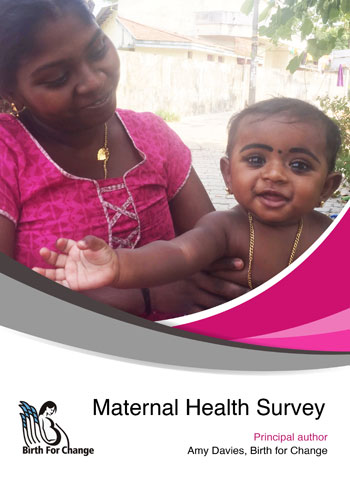MATERNAL HEALTH LITERACY PROJECT IN KOCHI, KERALA (INDIA)
Birth Village http://www.birthvillage.in/ south India's first natural birthing centre has created a local NGO - Birth for Change (BfC) - providing a variety of services to the women and girls living in the slum colonies of Kochi. BfC contacted Network for Information and Digital Access (NIDA), for assistance with a pilot project specifically addressing maternal health problems in this community.
This study was designed as a participatory impact assessment, testing the results of a programme of health education interventions, based upon specific questions relating to birthing practices, menstruation, diet, drugs and alcohol use. It used a selective interview process with a randomised survey and, finally, attempted to use a simple randomised case control for the effect of different types of maternal health interventions. These included inducements in the form of healthy food and dietary supplements as well as group education sessions in a pop up health clinic within the Udaya slum. 10% of the women in the two slum populations were interviewed.
The pilot project was carried out during 2017 as a partnership between Birth for Change (BfC) and NIDA. BfC provided the educational interventions and monitored their impact. The work is co-funded by Hardie Wren Development Initiatives (HWDI).
FINAL RESULTS
A final report has been written by Amy Davies of Birth for Change. Initially 100
girls and women chosen at random were interviewed with their responses entered
into a survey designed specifically for health literacy. Then, BfC set up a pop up
clinic in the Udaya slum called “Tejus”, the Malayalam word for light and offered six
well advertised clinics on different aspects of maternal health and nutrition
(including alcohol and drug use). It also offered one-on-one appointments with
the nurses and midwives of Birth Village.
Some of the most interesting findings related to the increasing importance of
education to the family budget and the use and expense of private medicine.
In addition, the diet was found to be quite varied and there were very low rates
of smoking and alcohol intake. Another positive finding was the high incidence
of breastfeeding.
However, the survey uncovered a real lack of education around menstruation and
the continuing inacceptability of this subject, even between mothers and their
daughters. In addition, these women are given very little information about any
aspect of maternal health at both local private and Government hospitals which is
resulting in a high incidence of Caesarean sections (32%) and miscarriage
(28%). There was a clear correlation between literacy and family income with the
type of hospital visited (private or Government run) and the incidence of non
vaginal births.
The final part of this pilot project - a second round of interviews to assess the
effectiveness of the educational clinics - did not take place due to local difficulties
within the slums. BfC will be focusing in the future, on providing information about
menstruation, contraception, pregnancy and birth practices which are where
education is most lacking.
PUBLIC PRESENTATION OF THE SURVEY RESULTS
HWDI presented the results of Phases 1 and 2 of the Maternal Health Pilot Study in
Kochi at the September 2017 meeting of the European Conference on Information
Literacy (ECIL) during a special session on Science Literacy
(http://ecil2017.ilconf.org/). In addition this project featured in a presentation
given by Dr. Allison Wren to the Women Leaders in Science, technology and
Engineering meeting, held in Kuwait in October
(http://wlste.org/WomenConference).

